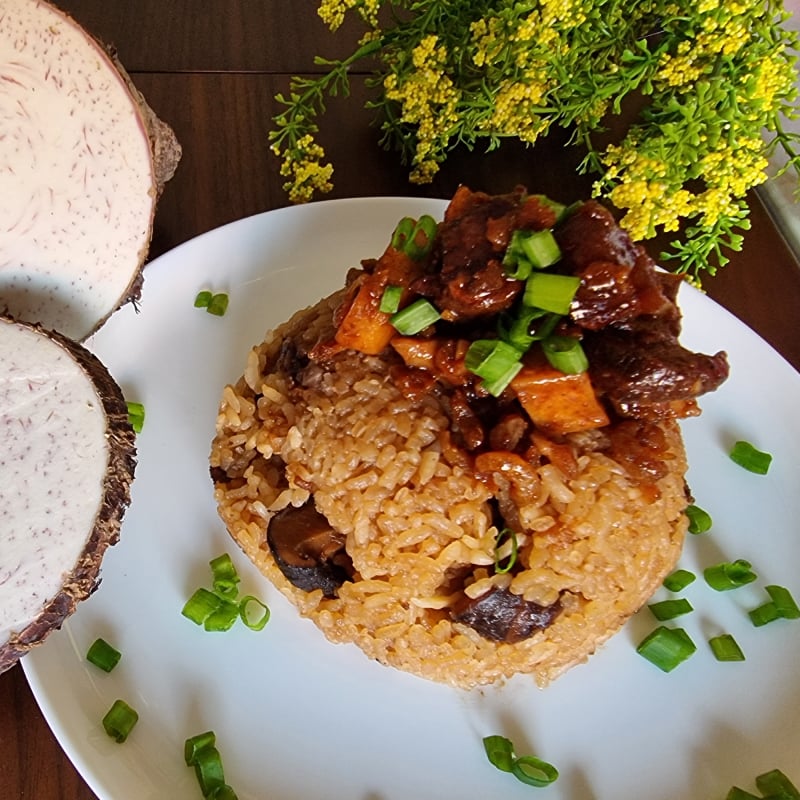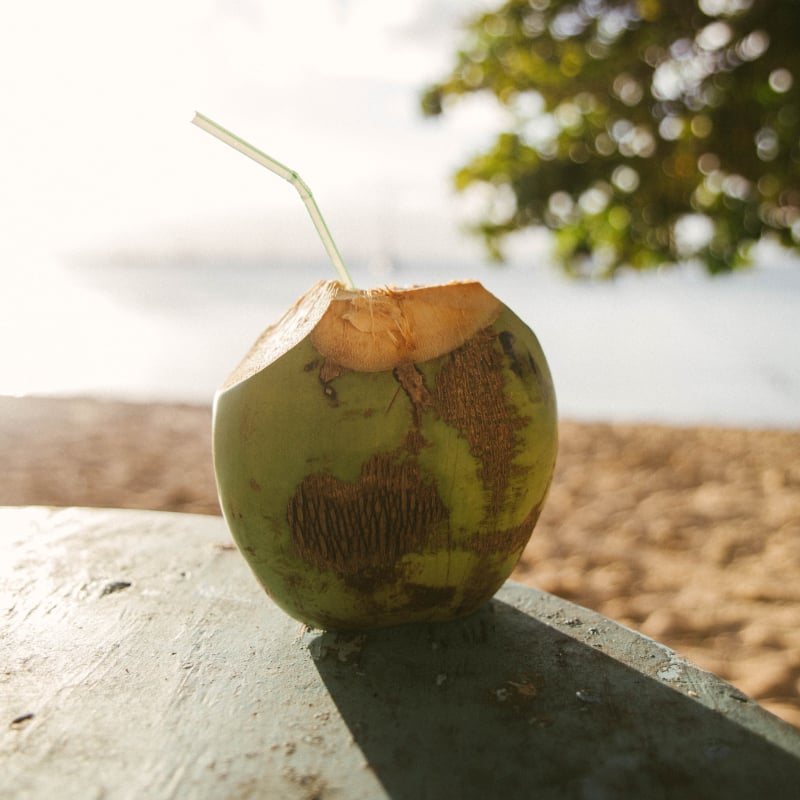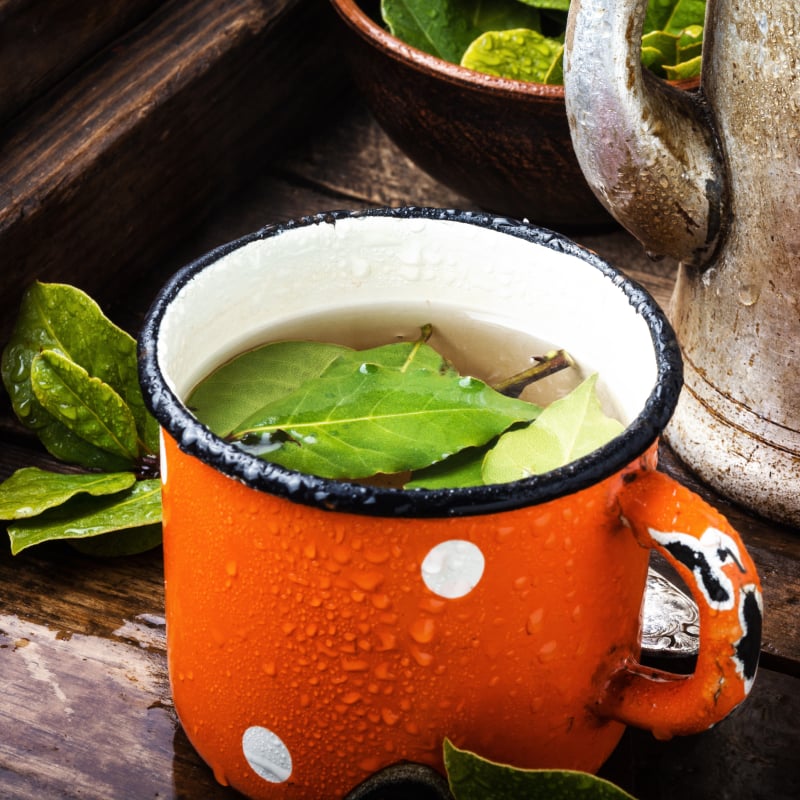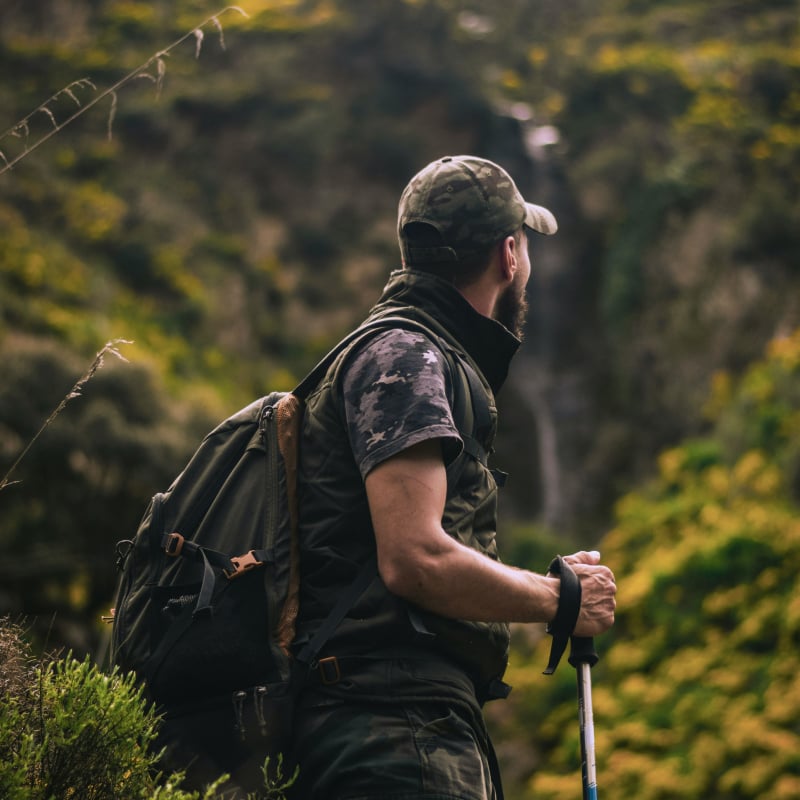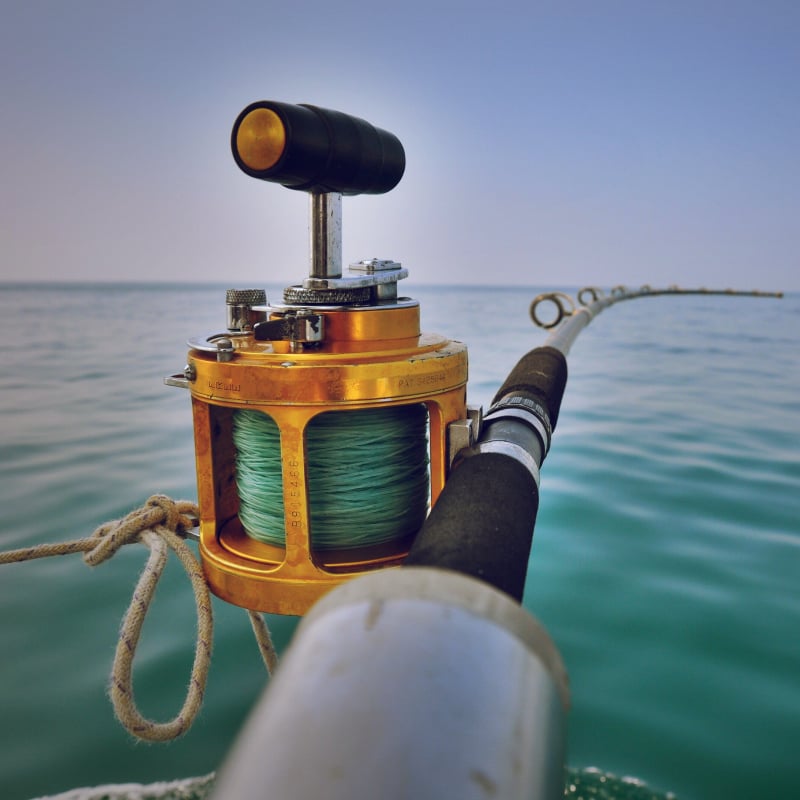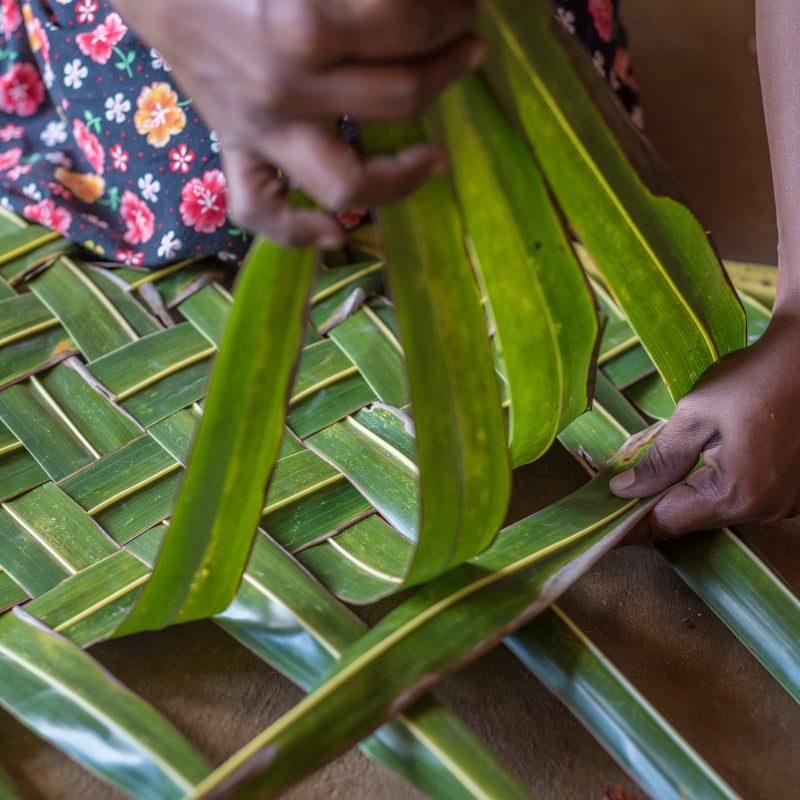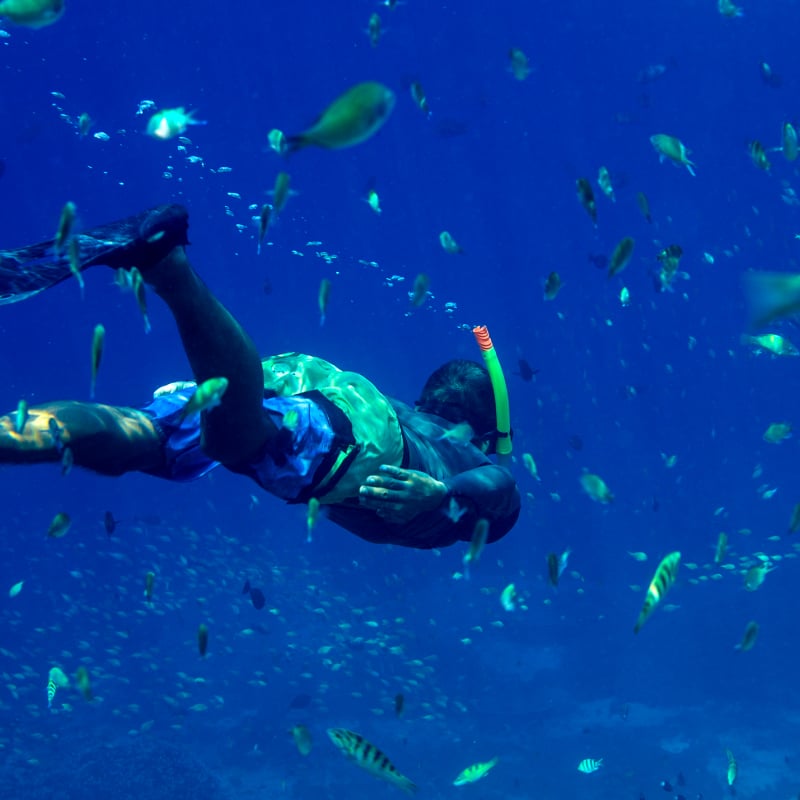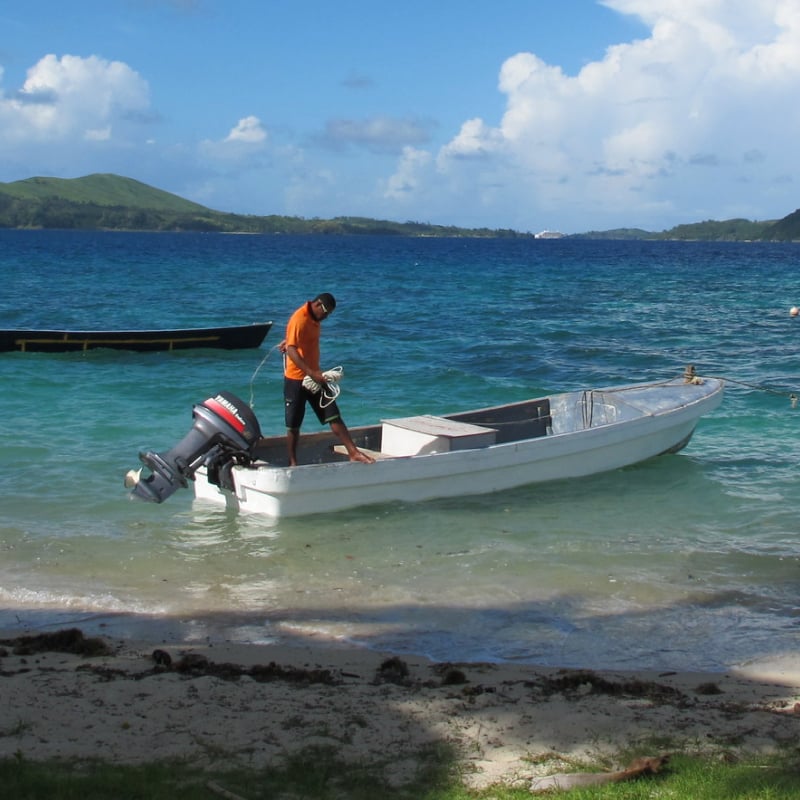
They Will Inherit the Earth
Volunteer with Children in Fiji
Contribute to the cognitive, physical and emotional growth of children in the Dawasamu district of Fiji.
Program information
Join us on an impactful journey to the Dawasamu district in Fiji. Your role will directly influence children’s lives, fostering their growth and development. On this volunteer with children program you’ll get involved in fun activities and educational support, shaping their cognitive, physical and emotional well-being. Your contribution counts – be part of this transformative experience today!
Program overview
Upon arrival at our base in the village of Silana, participants undergo initial training with GVI. This includes orientation to GVI’s protocols, an introduction to both GVI and Fijian culture, and a tour of Silana, your home away from home during your stay.
Participants receive specialised training, including TELF techniques, preparing them to lead structured learning sessions and early childhood development courses with caregivers.
You’ll be working towards the United Nations Sustainable Development Goal 4: Quality Education. Part of your role will be to develop and deliver sessions for children under five, enhancing their cognitive, emotional, social and physical skills. You’ll also provide short courses to caregivers, emphasising the significance of early childhood development and ways to support children’s growth at home.
On Mondays, we focus on planning, choosing engaging themes for activities. For instance, exploring colours helps develop fine motor skills and promotes teamwork. Participants also delve into the science of childhood development and receive training on delivering modules to caregivers.
From Tuesday to Thursday we visit nearby communities to deliver sessions. Friday is set aside for reflection and adaptation. Constant support is provided by trained field staff and participants will be accompanied by a local member of staff to facilitate these sessions.
Highlights

Make a direct impact on children under the age of five by supporting their skills development right at the beginning of their education.

Fiji is famous for its palm-lined islands, warm hospitality and cultural heritage. Find adventure and purpose in this truly idyllic destination.
Activities
Some of the example typical activities you could participate in on this program.

Receive training on project objectives, child safety protocols, an introduction to the local culture, and project planning and evaluation skills.

Develop and deliver sessions for children under five that support their skills development in key areas: cognitive, emotional, social and physical.

Deliver short courses to caregivers on the importance of early childhood development and the techniques used to support childhood development at home.

Get crucial career-building exposure working and communicating within a diverse team and specific local context.

Develop self-awareness, leadership, resilience and confidence, with support and advice from experienced GVI staff members.

Use your spare time during the week to self-reflect, raise awareness on community issues on social media, or fundraise for a local project.

On the weekend, visit other islands or relax in a nearby resort. Or travel to the city of Suva, home to many historical sites and cultural activities.
Skills
- Children issues
- Children rights
- Classroom management
- Safeguarding children
- Teaching English as a second language
- Working with children
Partners
Some of the partners we work with on base.
Program details
Dates and prices
Itinerary
06:30

06:30
07:00

07:00
08:00

08:00
12:00

12:00
13:00

13:00
16:30

16:30
17:00

17:00
18:00

18:00
What’s included?
General | |
|---|---|
| Food | |
| Safe and basic accommodation (usually shared) | |
| Airport pick up (unless stated) | |
| All project equipment | |
| 24-hour in-country support from local staff | |
| 24-hour emergency desk | |
| GVI Experiences |
Activities | |
|---|---|
| Sustainable project work | |
| Data collection and research |
Pre-program training | |
|---|---|
| Pre-departure webinar | |
| Pre-departure training (online) | |
| University of Richmond endorsed specialisation course |
Welcome training | |
|---|---|
| GVI welcome presentation | |
| Health & safety | |
| Local culture & environment | |
| UN SDGs | |
| Impact & ethics | |
| Child protection |
Certificates | |
|---|---|
| Program certificate | |
| University certificate – specialisation (University of Richmond) |
Not included |
|---|
| Flights |
| International and domestic airport taxes |
| Medical and travel insurance |
| Visa costs |
| Police or background check |
| Personal items and toiletries |
| Additional drinks and gratuities |
Life On Base
Base Photos
Boasting magnificent sunset views and swaying palm trees, our base is located on the edge of a traditional rural village, in the district of Dawasamu. We have Tova Peak on one side (the third highest mountain on Viti Levu) and the beach on the other. From your bed you can listen to the sounds of the crashing waves. A short boat ride away, you will find the famous Moon Reef with its resident pod of spinner dolphins.
Participating in a GVI program offers a unique opportunity to gain insight into Fiji’s culture of hospitality and warmth, and to experience what it’s like to be part of the community. On arrival, you’ll get to experience a “Sevusevu ceremony” – as a sign of respect you present yourself to the community to ask “permission” to stay. The ceremony is an age-old tradition that marks the formalisation of the community accepting and welcoming you, and celebrates your arrival.

Accommodation
Accommodation during your stay includes basic mixed-gender dormitory style rooms in a Fijian bure with wooden walls and a tin roof. There is a co...

Transportation
Transfers to and from the Nausori Airport in Suva take about 90 minutes and can be arranged with GVI in advance for the day before your program s...

Communication
You will have limited access to long-distance communications while on the program, so make sure friends and family know how often they can expect...

Meals
Food on base is mostly vegetarian, consisting of locally-sourced seasonal produce which participants take turns in preparing for the group. Break...

Climate
With a warm tropical climate, Dawasamu temperatures remain fairly constant throughout the year, at roughly...
GVI experiences included in your program, at no extra cost.
We want you to make the most of the chance to live in – and contribute towards – the most diverse and unique wildernesses and communities on earth. Introducing GVI Experiences – immersive adventure, cultural and wellness activities exclusive to GVI that have been specially designed in collaboration with our local partners to support and stimulate sustainable economic development.
Enhance your impact. Expand your adventure. Explore your world.
Free time
Joining a program not only allows you to collaborate with local communities, but also offers plenty of opportunities to explore the surrounding areas or travel further afield over weekends to see what other parts of the region have to offer.
Field staff are a great source of advice, and have helped us put together the following information on local travel options. Many decide to travel before or after their experience (subject to immigration restrictions), solidifying the lifetime friendships established on the program. Please note that the below suggestions are not included in the program fee, and are for you to organise at your own expense.
Weekend Trips

Coral coast
There are many day activities to choose from, such as ziplining and forest walks, as well as a variety of backpackers, resorts and beautiful beac...

Leleuvia Island Resort
Leleuvia is a coral island with beautiful white sands which can be reached by boat in 1.5 hours. This is a popular, although costly, destination ...

Dawasamu surrounds
Go for a hike into the nearby forests, swim in the hidden freshwater waterfalls, or visit some of the black volcanic sand beaches. If you feel like a more luxurious weekend, and...

Levuka
This is the old colonial capital of Fiji and a World Heritage Site – which makes for an interesting day trip. Levuka is located on the nearby Ovalau Island which is accessible b...

Historical excursions
Explore the history of this island nation by visiting the Fiji Museum in Suva, where you’ll find ancient tribal artefacts, and one of the best exhibitions on tribal art in the P...

Suva
The colourful capital city of Suva is known for its relaxed atmosphere, nightlife and

Diving
If you have diver’s training, you can enjoy scuba-diving at the various resorts and dive sites in the region. This region is home to abundant marine life, colourful corals and s...

Moon Reef dolphins
Take a short boat ride with a local fisherman to visit the famous pod of spinner dolphins that reside on Moon Reef all year round. This is a great way to meet the local communit...
Further Travels

Shark dive
Dive with bull sharks in Beqa Lagoon, one of the world’s most famous shark diving destinations.
...
Nature parks
Consider a trip to the Sigatoka Sand Dunes National Park, where you’ll find a miniature desert of rolling sand dunes, or for a more relaxing option you can visit the Coral Coast...

Adventure
From Pacific Harbour, you can join a jetski safari, or go white-water

Sabeto hot springs
Located midway between Lautoka and Nadi on the main island of Viti Levu, you can indulge in a day of luxury and pampering. The hot springs are believed to have healing propertie...

Nadi
Explore the town of Nadi, which is about five hours away. Here you will find markets, the Garden of the Sleeping Giant, beautiful beaches, resort...
Cultural Immersion
Engaging intimately with a new context teaches global awareness, adaptability and critical thinking – skills highly valued in the modern marketplace. Local and cultural immersion is encouraged on all our programs around the world, and will also be one of the most enjoyable aspects of your experience. Luckily, there are many different activities that you can get involved in during your free time, or before and after your program.
On our community programs, the focus is on cultural topics, while on marine or wildlife programs the emphasis is more on the environmental element. Use your evenings and weekends to explore topics like local cuisine and religion, or how sustainable development challenges are affecting local contexts.

The local community
Fijians are some of the friendliest people in the world, provided you respect their traditions and customs. The local community is typically warm and eager to welcome visitors. ...

Spirituality and religion
Christianity is the dominant religion practiced in Fiji, followed by Hinduism and Islam. Prior to the nineteenth century, indigenous Fjians practiced various traditional religio...

Local handcrafts
Fiji has a thriving souvenir industry. Local artists produce various intricately carved wooden items.
...
Cooking
The national dish of Fiji is Kokoda, which is a combination of fresh fish, pickled in lemon juice. Coconut milk is then added, along with tomatoes and chillies. The dish is seas...

Festivals
There are festivals throughout the year, the most notable being Fiji Day, celebrating Fiji’s independence. This is celebrated in October with a week of religious and cultural ce...

Languages
Fiji has three official languages: English, Fijian and Fiji Hindi. Fijian is spoken as the first language by most indigenous Fijians while Indo-F...
Speak to alumni

If you’d like to find out what the experience of joining a GVI project is really like, simply contact us and we’ll put you in touch with one of our many Alumni.
We’ll try to match you to an Alum based on your location, nationality, age, stage of academic career, gender, and program interests. This allows you to gain insights into the experience that is most relevant to you.
Depending on your location you might be able to speak to an Alum over the phone or online, or meet up with them face-to-face at a coffee shop nearby. We also run a series of small events around the world where you can speak to GVI Alumni, Ambassadors and staff members.
Get a first-hand perspective
Meet the team
Get acquainted with the GVI Australasia, Fiji, Dawasamu family

Michele Comber
Program Manager
Meet Michele, our brilliant Program Manager in Fiji. She has travelled widely in the US,

Meli
Community Coordinator
This is Meli Rabele, our Community Coordinator from our base in the district of Dawasamu, Fiji. He is very proud of the work he is a part of here in Silana village, where he ass ...

Litia
Education Coordinator
Meet our Education Coordinator, Litia. She is based in Silana village in Dawasamu, Fiji. She is extremely passionate about teaching children and early childhood development and ...

Sereima
Community Health Officer
Meet Sereima our Community Health Officer in Dawasamu, Fiji. She is a local of Silana village where our Fiji hub is based. She loves new meeting people, playing volleyball and w ...
Parent Info
‘If only every student could do this. It changes your life in all the right ways,’ says Chris Heritage, parent of Luke Heritage, one of our teen volunteers who has participated on two GVI programs, one in Costa Rica and another in South Africa.
We are a parent-run organisation that is incredibly serious about health and safety, and increasing the impact, as well as the long-term career benefits of our programs. Our programs help young people develop the skills to select a career path that is personally fulfilling, and live a life aligned to the well-being of our planet and the global community.
GVI is a proud member of the Gap Year Association.
Ken and Linda Jeffrey, whose son Sam volunteered with GVI in Thailand, talk about how the experience affected Sam. He also went on to volunteer with GVI again in South Africa. ‘I know it sounds like a cliche but in a sense, he did go away as a boy and he came back as a young man. Both of us could recommend GVI without any hesitation to any other parent thinking about exploring an opportunity for their children to explore the world and to see different parts of it.’
Parent Info Pack
Download the Parent Pack and learn more about:
Our staff: All our projects are run by staff, selected, vetted, trained, and managed by our central office.
Health and safety: Our safety practices include a child and vulnerable adult protection policy and high participant ratios.
Staying in touch: See what’s happening on base, by following a hub’s dedicated Facebook page.
Free parent consultations: We would love to talk to you about exciting opportunities available for your child.
Arrivals




When it comes to support, we ensure that each participant is provided with unparalleled, 360 degree support, from your initial contact with the GVI Family, all the way through your program, and even after, as you become part of the GVI Alumni Team.
As part of this promise, we will ensure, whenever possible, that one of our dedicated staff will be available to meet you at the airport. In most locations, we also set up a Whatsapp group to help with managing airport arrivals.
We will arrange with you prior to your departure that, should you arrive in the agreed upon pick up window, a member of our staff will be there to welcome you, easily identifiable in a GVI t-shirt or holding a GVI sign and wearing a friendly smile.
This means there will be someone there to greet you as you land, and from there you will be transported to your GVI base to start your adventure and meet the rest of your team.
Your Impact
All of our programs have short-, mid- and long-term objectives that align with the United Nations Sustainable Development Goals (UN SDGs). This enables us to report on our collaborative impact across the world in a streamlined manner, measuring which UN SDGs we are making a substantial contribution to. Furthermore, this will help our local partners and communities measure and visualise their contribution to the UN SDGs.
Prior to your arrival on base, you will be educated about the UN SDGs. Then once you arrive on base, you’ll learn about the specific goals we have in this particular location, our various objectives, and also clarification of how your personal, shorter-term involvement contributes to these.
Our aim is to educate you on local and global issues, so that you continue to be an active global citizen after your program, helping to fulfil our mission of building a global network of people united by their passion to make a difference.

While on a GVI program, you will make an impact by assisting with the conservation of a staggering 1,500 marine species through underwater surveys and data collection, all of which are endemic to this region.
The communities we work with in Dawasamu often do not have access to sufficient resources to carry out regular data collection in their fishing grounds. Access to data provides greater insight into how to address coral reef and fish stock-related problems, which can be hampered by natural disasters and unsustainable fishing practices.
The data collected on our programs is provided to the local community and our local partners along with alternative livelihood methods and management strategies to help stakeholders make informed decisions with regards to their existing marine resources and long-term food security.
Research is shared with local communities to support decision making regarding the management of their marine assets.
The data is also shared with our in-country partner – the Fiji Locally Managed Marine Area (FLMMA) network.
Project objectives
GVI Dawasamu long-term objectives:
1. Improve waste management in Dawasamu by developing community-based waste management solutions such as a successful recycling initiative.
2.Assist communities with the acquisition and set-up of rainwater harvesting tanks and educating them on how to safely use and maintain the system.
3. Introduce and promote the principles of Water, Sanitation and Hygiene (WASH) and preventative health measures in the Dawasamu District.
4. Develop and deliver sessions for young children that support the key developmental areas of cognitive, emotional, social and physical skills.
5. Waste Management: Conduct regular cleanups of the sea and beaches on and around the Dawasamu district.
Our Ethics
Below is a list of core ethics and best practices we believe are essential to the operation of high quality, ethical volunteer and sustainable development programs. We believe that all responsible volunteer and sustainable development operations should focus upon these principles. If you are considering volunteering, these are some of the key considerations you should question, to ensure that your time and money contributes towards positive change.
We want to constantly develop our own understanding of ethical best practice. In so doing, we aim to provide an exemplary industry standard for other education institutions, international development organisations, and social enterprises. Our Badge of Ethics stands for the drive to always do good, better. Find out more, click on the Badge below.
Our 10 ethical commitments
01
Locally Driven, Collaborative Projects
We aim to design all our projects in collaboration with local organizations and communities and ensure that they are locally driven.
02
Clear Objectives & Sustainable Outcomes
We aim to clearly define short-, mid-, and long-term objectives with sustainable outcomes for all our projects.
03
Impact Reporting
We aim to track, record, and publish the impact of each of our projects.
04
Working Against Dependency
We aim to build in-country capacity by assisting local organizations in becoming self-sustaining.
05
Responsible Exit Strategies
For each local organization we work with, we aim to have a plan in place for withdrawing support responsibly.
06
Clear Roles & Specialized Training
We aim to ensure that every participant is assigned a clear role and that they are fully trained and supported to carry out their work by specialized staff.
07
Respect for all
In all our actions we aim to respect the skills and efforts of all and seek to protect the rights, culture and dignity of everyone who engages with GVI.
08
Local Ownership
We work to ensure that credit for the results of any project, along with any data collected, research conducted, or Intellectual Property developed, remains the property of local organizations.
09
Transitioning from the Orphanage Model
We do not condone and aim to withdraw support of orphanages and residential care centers.
10
Child and Vulnerable adult policies
We will live by our Child Protection and Vulnerable Adult policies.
Continual Development
As an organization, GVI is committed to striving toward best practice, and to educating both our potential participants, our partners, and the world at large about them. Both the volunteering and sustainable development sectors are increasingly, and rightly, under scrutiny. Many recent local and global articles highlight poor practices and questionable ethics. GVI is widely recognized for striving to apply global best practice in the volunteering, education and sustainable development sectors throughout our operations by reputable organizations such as ChildSafe.
However, global best practice is always evolving and we dedicate both time and resources to engage with internationally respected experts and learn from the latest research to ensure our programs both fulfil their potential to create maximum positive impact, and minimise their potential to create unintentional negative impact. Along with and as part of the sustainable development and volunteering community, we are constantly learning and applying this learning to practice. We do not always get everything right, but we seek feedback from our community members, partners, participants and our staff, and react accordingly. We know are already doing a great job, and feedback we have received confirms this, but we aim to do even better and are continuously refining our operations to improve upon our already excellent reputation.
Program ethics
No entertainment-based activities
We don’t support the use of wild animals for entertainment purposes. This includes riding animals, having them perform tricks, feeding or bathing them or getting close to them to take photos
No orphaned animal sanctuaries
We don’t encourage, support or allow the rearing of “orphaned” wild baby animals kept at a “sanctuary”. The conservation value of these types of programs is negligent and would only ethically be used in extremely rare cases
Guidelines for touching or movement restriction
When wild animals are restricted for conservation purposes we follow the guidelines of Fair Trade in Tourism South Africa (FTTSA), approved by the Global Sustainable Tourism Council.
Animal welfare guidelines
We ensure that the Five Freedoms of Animal Welfare are followed. These include the freedom to express normal behaviour and freedom from distress, discomfort, hunger, thirst, fear, pain, injury or disease.
Local community empowerment
We ensure that conservation efforts are also always locally led, that community needs are front-and centre of any conservation effort and that our participants, projects and partners work to increase local community engagement in local conservation efforts.
No veterinary programs
We don’t offer any veterinary programs or animal rescue and rehabilitation programs. We don’t allow participants to do any work they would not be able to do in their home country.
No orphanage programs
We don’t support or allow participants to work in institutional residential care facilities, also known as orphanages. We partner with ReThink Orphanages and Freedom United.
Child and vulnerable adult protection policy
Our Child and Vulnerable Adult Protection Policy requires all our staff and participants to complete a criminal background check and to learn why you shouldn’t reveal a child’s identifying factors in photographs. We support the ChildSafe Movement.
No medical volunteering
We don’t offer any programs where our participants engage in medical treatment. This is because our participants aren’t typically qualified to do this work and would therefore not be able to do this work in their home country. Our participants only assist with public health programs.
No disability support programs
We don’t offer any programs where our participants work directly with people with disabilities. This is because our participants aren’t typically qualified to do this work and would therefore not be able to do this work in their home country.
Training
A GVI program is an investment in your career. No matter which you choose, you will be working toward improving your employability by mastering new social skills, gaining further technical expertise and earning qualifications in many cases. Most of our staff are, in fact, GVI Alumni, and we have helped many of our Alumni discover, move toward, and earn their own personal dream jobs. Each program includes introductory workshops, ongoing presentations, as well as on-the-ground professional support provided by our very own trained staff members. In addition, our training programs are critical for helping us to ensure the long-term impact of our sustainable development projects around the world.
For all GVI participants
Orientation: Travelling Responsibly and Ethically
Learn about the importance of child and vulnerable adult protection best practices and how to apply them while on project.
Orientation: UN Sustainable Development Goals
Introduction to the history and evolution of sustainable development, the United Nations Sustainable Development Goals (UN SDGs) and how these related to your project work.
Orientation: Further Opportunities for Impact
Learn about our country locations and further opportunities available to you during or after your program.
For all participants at Dawasamu
Education
During your first days on the project, you will participate in several training sessions that emphasise the key teaching skills useful for our education program, including learning through play and lesson planning. You’ll also gain soft skills in communication, collaboration and organisation, and complete an overview of completed project work, items in process, as well as future plans. Lastly, you will learn how our work contributes and longer term sustainable goals, and how they link to the SDGs.
Objectives and Impact
Dawasamu on Education and Community project.
Village Presentation
All about the village of Silana, traditions and cultural information.
Dawasamu Welcome Presentation
Overview of GVI and Project work.
Dawasamu Cultural Presentation
Overview of Fiji and its traditions and culture.
Certificates & qualifications

GVI Online Community Development course (optional)
In this course, you’ll explore the most common pitfalls of community development initiatives so that you can avoid them. You’ll also learn how to carry out community development work effectively and ethically and how local context impacts program development. After successfully completing the course, which you have the option of doing prior to your in-country program, you’ll receive a certificate from the University of Richmond.
This online course, valued at £295, is included in all volunteering programs. Full course details can be found here.
Support & Safety
We won’t sugarcoat it — traveling abroad is usually a complex process that carries an element of risk. But this is exactly why we’re passionate about providing extensive support throughout the process as well as the highest safety standards during the in-country phase. We believe that volunteering abroad should not only be impactful, but an enjoyable experience that carries as little risk as possible. This is exactly how we’ve been able to maintain our reputation as the most highly respected volunteering organisations in the sector over the past two decades.


Health and safety case studies

How GVI upholds health and safety
It takes courage to book a GVI program, get on a flight, and head off to somewhere new. Volunteering offers a level of cultural immersion that typical backpacking or holidays ju...

GVI's commitment to safety and security
As the saying goes: ‘Expect the best, plan for the worst’. Cliched or not, we take it to heart. This tenet is at the core of how GVI operates when it comes to promoting the heal...

How GVI remains prepared for natural disasters
The weather isn’t just a topic for polite small-talk here at GVI. We have emergency action plans in place for all scenarios. So when the weather, or other natural forces, takes ...

How GVI manages participants expectations
Once GVI has matched a participant to a program that suits their passions and goals, our team aims to set the right expectations for them. In the event that false expectations a...
Make the most of our unique programs with these exclusively curated local adventure and wellness experiences.
















Want to connect with some of our past participants about their adventures? Get in touch with hundreds of friendly ambassadors all over the world who would be more than happy to answer any questions.





